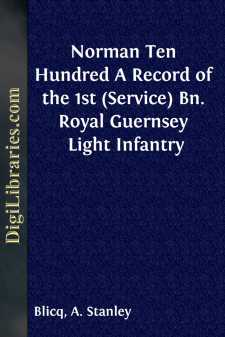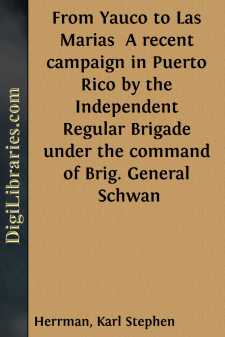History
- Africa 30
- Americas (North Central South West Indies) 50
- Ancient 68
- Asia 58
- Australia & New Zealand 8
- Canada 41
- Caribbean & West Indies 1
- Civilization 20
- Eastern Europe 12
- Europe 310
- Expeditions & Discoveries 60
- General 77
- Historical Geography 1
- Jewish 9
- Latin America 3
- Medieval 8
- Middle East 14
- Military
- Revolutionary 8
- Study & Teaching 5
- United States 353
- Western Europe 56
- World 13
Military Books
Sort by:
by:
A. Stanley Blicq
Fed up! Every man of the Ten Hundred was fed up. Thirty-six hours cooped in cattle trucks, thirty or forty in a truck and inhaling an atmosphere that would have disgusted a pig—enough to feed anyone up. The Belgian frontier was crossed at sunset and the fringe of war's devastation penetrated. Little interest or casual comment was aroused, although a reputable thirsty one remarked that he thought...
more...
by:
Frederic Shoberl
NARRATIVE, &c. You know, my dear friend, how often I have expressed the inconsiderate wish to have some time or other an opportunity of witnessing a general engagement. This wish has now been accomplished, and in such a way as had well nigh proved fatal to myself; for my life had like to have been forfeited to my curiosity. I may boast, however, with perfect truth, that, during the four most...
more...
by:
John McElroy
The rations diminished perceptibly day by day. When we first entered we each received something over a quart of tolerably good meal, a sweet potato, a piece of meat about the size of one's two fingers, and occasionally a spoonful of salt. First the salt disappeared. Then the sweet potato took unto itself wings and flew away, never to return. An attempt was ostensibly made to issue us cow-peas...
more...
The Value of the One Lucy Lee laid her head on her pillow and, looking through the silence and darkness, smiled up to God. She had won her first soul for Him, and now made her offering. The capture was not a drunkard, nor an outcast–many of whom, in years to come, she was to wrestle over and deliver–but her own sister, whose golden hair lay over the pillow beside her, and whose regular breathing...
more...
by:
Fa'iz El-Ghusein
FOREWORD I am a Bedouin, a son of one of the Heads of the tribe of El-Sulût, who dwell in El-Lejât, in the Haurân territory. Like other sons of tribal Chiefs, I entered the Tribal School at Constantinople, and subsequently the Royal College. On the completion of my education, I was attached to the staff of the Vali of Syria (or Damascus), on which I remained for a long while. I was then Kaimakâm of...
more...
CHAPTER I INTRODUCTORY REFLECTIONS The bursting of a thunderstorm is preceded by certain definite phenomena in the atmosphere. The electric currents separate, and the storm is the result of atmospheric tension which can no longer be repressed. Whether or no we become aware of these happenings through outward signs, whether the clouds appear to us more or less threatening, nothing can alter the fact...
more...
by:
Robert Herrick
I Italy Hesitates Last April, when I left New York for Europe, Italy was "on the verge" of entering the great war. According to the meager reports that a strict censorship permitted to reach the world, Italy had been hesitating for many months between a continuance of her precarious neutrality and joining with the Allies, with an intermittent war fever in her pulses. It was known that she was...
more...
CHAPTER I The Independent Regular Brigade Place of meetingвÐâForces comprised by the commandвÐâWhy we were not like the VolunteersвÐâCharacteristics of the professional soldierвÐâSketches of the more important officersвÐâWhat we were ordered to do. Yauco, the place selected by General Miles as a rendezvous for the troops of the Independent Regular...
more...
I EUROPE WITHOUT PEACE Is there anyone who still remembers Europe in the first months of 1914 or calls to mind the period which preceded the first year of the War? It all seems terribly remote, something like a prehistoric era, not only because the conditions of life have changed, but because our viewpoint on life has swerved to a different angle. Something like thirty million dead have dug a chasm...
more...
by:
Sam R. Watkins
CHAPTER I RETROSPECTIVE "WE ARE ONE AND UNDIVIDED" About twenty years ago, I think it was—I won't be certain, though— a man whose name, if I remember correctly, was Wm. L. Yancy—I write only from memory, and this was a long time ago—took a strange and peculiar notion that the sun rose in the east and set in the west, and that the compass pointed north and south. Now, everybody knew...
more...











